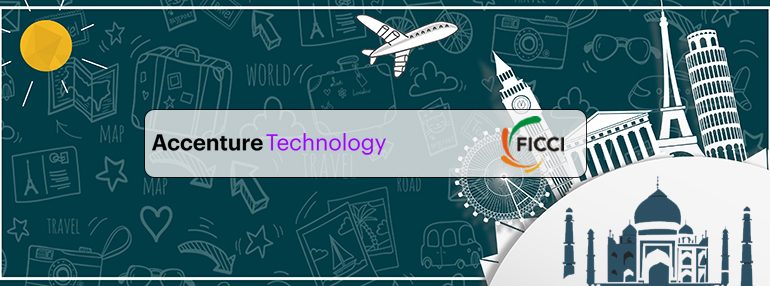As 2021 draws to a close – it is perhaps only natural to look back to see where we are. Since the pandemic changed our lives forever and reset the global economy, we look at how the sudden halt of business and leisure travel has hit the travel-hospitality and retail industries the hardest. In an ongoing series of blogs, Accenture examines various aspects that have impacted the travel industry and how it can recover to get back on the growth path.
With companies moving work online and the subsequent focus on flexible and hybrid working models, corporates are introducing new business travel guidelines that enable employees to make responsible choices and travel purposefully. In many parts of the world, travel, particularly business travel continues to be affected. Consequently, the ‘back to normal’ for business travel is significantly slower than it is for leisure travel. In this context is it important to look at the consumer retail sector – an equally affected industry at the start of the pandemic. However, the retail industry was among the first to recalibrate and revive by embracing technology at speed. It reinvented customer interactions, online channels, supply chains and moved closer to the consumer. It is only prudent for the travel sector to examine the experience of the retail industry more closely and adopt good practices that can hasten the transition back to growth and profit. How can the travel industry, mirroring the retail experience, cover lost ground and embrace the future? The travel retail business, that was poised at US$ 74.31 Bn in 2019, fell by 55 percent the following year, but can now expect a steady increase in sales as restrictions are eased and both business and leisure travel get back on track.
For retailers crafting their comeback journey, the big challenge was not just limited to leveraging technology to create an omnichannel experience for customers but also to revive walk-ins back into stores. While most trends reflect that shopping online has increased post the pandemic, retailers have leveraged in-store technology to enhance the in-person shopping experience to help draw customers back into stores. Technology is being leveraged across three key parameters – pricing; product development and experience – and finally, convenience, thereby helping retailers not just acquire customers but also optimize how they are served and retained better.
Take the example of grocery. It was only a few years ago that the traditional grocery industry, recognizing that it was hamstrung by legacy technology realized that digital transformation was inevitable to appeal to customer’s changing needs and stay afloat in an increasingly crowded marketplace. For instance, Sainsbury’s a grocer that opened its first store in 1869—transformed itself from a catalogue-led business to a digital-led business. By transforming mobile, web and tablet digital channels, the company has recovered sales and driven profits.
These are important lessons for the travel sector to leverage, more so due to its already existing association with retail. Technology including, but not limited to AI, Big-Data, automation, and augmented reality (AR) can help enhance and cross-leverage opportunities with retail to offer travelers a greater, more holistic travel experience. The good news is that the travel industry has begun to embrace new approaches that can reengage customers. However, this needs to be mainstreamed across the sector to provide more personalized and omnichannel experiences to customers while also improving organisational and operational models that further business opportunities. We believe that there are several pivots that are important for the travel industry to consider and adopt.
Negotiating the Return to Service – This factor was significantly witnessed in the hospitality and logistics services sectors as truck drivers, store operators, as well as trained front-end staff dropped off during the pandemic. This resulted in a big gap in availability of reliable and trained manpower – something that the retail industry has worked on relentlessly to plug over the last few quarters. Automation has been key to ensure business continuity and prevent (or minimize) challenges, such as these from reoccurring in the future. So, they introduced contactless deliveries, brought in chatbots, encouraged DIY, and brought in robots (to be used in warehouses for example). While humanoids are already in use by hotels such as Yotel Boston, those closer home such as the Oberoi Hotels and ITC Grand are reportedly considering using humanoid robots to interact with customers, help them in check-in and serve food in restaurants to reduce human interaction and enhance guest safety.
Going multi-channel to shop the-way-you-like: It is no secret that travel, whether for business or leisure, has a close and symbiotic relationship with retail. A mid-year report from m1ind-set on post pandemic travel retail consumer trends reveals an enhanced focus by international travelers towards a more sophisticated e-commerce experience. 53 percent of travelers highlight their willingness to shop online or pre-order online and collect their goods either upon boarding their flight or on arrival at the destination airport. This applies to ‘duty-free’ items as well. This is significantly higher than 2020, when only 24% travellers indicated that they would be willing to shop for their duty free and travel retail items online. Taking heed of changing preferences during the pandemic, Dubai International airport is now encouraging travellers to shop using a ‘click and collect’ service up to 48 hours prior to departure. The airport also offers an option for travellers to order products through a new concierge counter and have them delivered directly. On their part, some of the world’s leading airlines such as Singapore Airlines and Emirates are encouraging passengers to go digital to further their travel and retail experience. So, while the former is encouraging passengers to shop online via the KrisShop ecommerce platform, the latter is asking its passengers to use virtual reality to tour the entire aircraft and explore multiple features on offer before they even step on board. At the other end of the spectrum, the Ritz-Carlton now enables both, its guests and other shoppers to order their favorite luxury items including robes, spa products, and linen from its online Ritz Carlton retail store to recreate a resort experience at home.
Increasing Personalization: Knowing customers better, triangulating their presence and offering them more customized offerings involves revitalizing the store experience and integrating retail even more into travel. Dior launched a virtual reality store based on its flagship location in Paris. The 360°, 3D experience encourages customers to have an immersive and more personalized experience with products before purchasing them. Similarly, Accenture has helped the much-loved restaurant brand Tim Hortons, leverage exceptional digital and loyalty services via a new mobile app experience and loyalty program to enhance personalized customer engagement that helps retain valuable guests.
At the travel end, Changi airport decided that it needed to embrace a digitally ‘smart’ future that would allow it to transform the passenger experience, before, during and after travel. The airport realized that its passengers were not comparing their current trip to their last one – they’re comparing it to the frictionless way they can order a cab or buy products online and hence customer experiences are reshaping expectations for every interaction. Today, among other things, Changi is engaging with passengers via a virtual assistant chatbot that can respond to customer queries 24/7 about travel/flights, shopping, entertainment, lost property and navigation matters. The airport also sends targeted personalized offers and services—based on preferences and behavior—to the right customers at the right location and at the right time. As the gap between travellers’ digital and in-person experience narrows, it allows travel brands to deliver more memorable moments and improve brand loyalty, thereby creating compelling differentiates vis-à-vis the competition.
Sustainability and Supply Chain Resilience: According to research from Accenture, some 66 percent of consumers said they are ramping up their sustainable or ethical purchasing, and 74 percent reported choosing where to shop based on values and ethical corporate practices. The rise in environmental awareness and the intense scrutiny on brands reducing their carbon footprint increased post the pandemic. This has consequently made the travellers, especially younger ones, more sensitive to ecological issues. Buzz words such as local sourcing, zero-waste production, recycling, conservation and habitat protection and sustainable consumption are now mainstream lexicon. Just as these issues are affecting retail, they will also determine the future of travel. In this context, the World Travel & Tourism Council (WTTC) in collaboration with the UN Environment Programme (UNEP) and Accenture, joined forces to provide concrete recommendations for the journey ahead. The Roadmap, developed in close consultation with key representatives of the global Travel & Tourism sector, highlights the current status quo and provides ambitious industry milestones for meaningful climate action and emissions reduction. It offers a realistic and pragmatic overview of the roadblocks and how we can decarbonise to achieve a net zero future and ultimately protect our beautiful world to help address the most pressing global challenge of our times.
Travel brands are already beginning to pay heed to this. By extending the benefit of disciplined product sourcing to its clients, the Marriott hotels now offer its guests the benefits of buying both foam and inner spring mattresses from them and have also seen a huge profit accrue basis the sales of mattresses and pillows. On the retail side, high fashion is increasingly leveraging virtual reality in a manner that not just connects with clients but also sustainably impacts the supply chain by reducing pressure on inventory, cuts wastage and reduces costs. Virtual fitting rooms save costs and resources for the retailer as the buyer can virtually try out the outfit even before it is made. Not only does this enhance the levels of personalisation by leveraging technology, but it also leaves no carbon residue. Virtual reality and augmented reality can similarly do much for the travel industry by allowing customers to engage with their hotel and the airline of their choice from the comfort of their homes and then choose the one that are more aligned to their budget and promises them the best experience.
A time to reset: Technology is underpinning the recovery of business and the retail sector has been at the helm of driving this change. It is no secret that it will take time for the travel industry to get back to its pre-pandemic times heydays. The sector can accelerate its journey by harnessing emerging tech to drive insights and create new systems and processes for a more immersive and meaningful digital experiences for customers, simultaneously making the supply-chain more resilient and reducing the industry’s carbon footprint. The travel industry must seize this unprecedented opportunity to reset and re-imagine the future.
| Co-Authors | ||

Harish Ranganath |

Tarandeep S. Chandhok |

Ashish Kumar |





